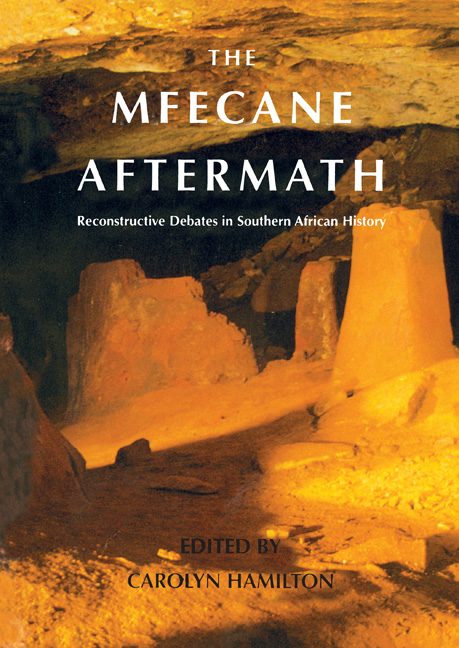Book contents
- Frontmatter
- Contents
- Maps
- Preface
- Acknowledgements
- Notes on Orthography and Names
- Contributors
- Introduction
- Part One Historiography and Methodology
- Part Two The South-Eastern Coastal Region
- Part Three The Interior
- ‘The Time of Troubles’: Difaqane in the Interior
- 11 Archaeological Indicators for Stress in the Western: Transvaal Region between the Seventeenth and Nineteenth Centuries
- 12 Prelude to Difaqane in the Interior of Southern Africa C.1600-C.1822
- 13 Conflict in the Western Highveld/Southern Kalahari c.1750-1820
- 14 ‘Hungry Wolves’: The Impact of Violence on Rolong Life, 1823-1836
- 15 The Battle of Dithakong and ‘Mfecane’ Theory
- 16 Untapped Sources: Slave Exports from Southern and Central Namibia up to c. 1850
- Glossary
- Abbreviations
- Bibliographer's Note
- Bibliography
- Complete List of Papers Presented at the Colloquium
- Index
16 - Untapped Sources: Slave Exports from Southern and Central Namibia up to c. 1850
from Part Three - The Interior
Published online by Cambridge University Press: 31 May 2019
- Frontmatter
- Contents
- Maps
- Preface
- Acknowledgements
- Notes on Orthography and Names
- Contributors
- Introduction
- Part One Historiography and Methodology
- Part Two The South-Eastern Coastal Region
- Part Three The Interior
- ‘The Time of Troubles’: Difaqane in the Interior
- 11 Archaeological Indicators for Stress in the Western: Transvaal Region between the Seventeenth and Nineteenth Centuries
- 12 Prelude to Difaqane in the Interior of Southern Africa C.1600-C.1822
- 13 Conflict in the Western Highveld/Southern Kalahari c.1750-1820
- 14 ‘Hungry Wolves’: The Impact of Violence on Rolong Life, 1823-1836
- 15 The Battle of Dithakong and ‘Mfecane’ Theory
- 16 Untapped Sources: Slave Exports from Southern and Central Namibia up to c. 1850
- Glossary
- Abbreviations
- Bibliographer's Note
- Bibliography
- Complete List of Papers Presented at the Colloquium
- Index
Summary
This essay was written as a reaction to the attempts to prescribe the ‘Mfecane’ as a historiographical panacea for Namibian history. Until the mid-1980s Namibia's unique historiography - the idea that Namibian history did not exist prior to the German and South African occupations - served to shield it from mfecane mythology. However as historians have sought to develop an ‘authentic African’ Namibian history, they have begun taking nips of this addictive brew. Of late historians have had Kololo or other ‘Zulu-ised’ hordes zigzagging out of the southern African highveld and attacking Herero settlements in western Botswana and eastern Namibia.
At present I do not dispute that these attacks took place for there is no question that central and southern Namibia were shaken up in the early nineteenth century. I do, however, dispute the idea of the mfecane as the cause of all these disturbances. The perspectives robs Namibia of its history, and might, as was the case with South African history, spawn decades of informationless history, obscuring details of Namibia's past. In no way do I wish to argue that Namibian history was formed within a unique area encapsulating present-day Namibia, untouched by events in surrounding areas. Jonker Afrikaner did not suddenly materialise out of nowhere. Namibian history is inextricably linked with that of the rest of southern Africa and the world; the same historical processes operating in the rest of Africa operated in Namibia. It would, however, be wrong to sully Namibian history with the myths of the mfecane. Instead this essay falls within the stream of thought which argues that the expulsion of the Oorlam into present-day Namibia and the raiding for cattle, goods and slaves for the Cape and Atlantic trade were the prime causes for the instability in central and southern Namibia in the early nineteenth century.
It is a generally accepted historical thesis that no slaving for the transatlantic or Cape colonial trade ever occurred in precolonial central and southern Namibia.
- Type
- Chapter
- Information
- Mfecane AftermathReconstructive Debates in Southern African History, pp. 417 - 436Publisher: Wits University PressPrint publication year: 1995



